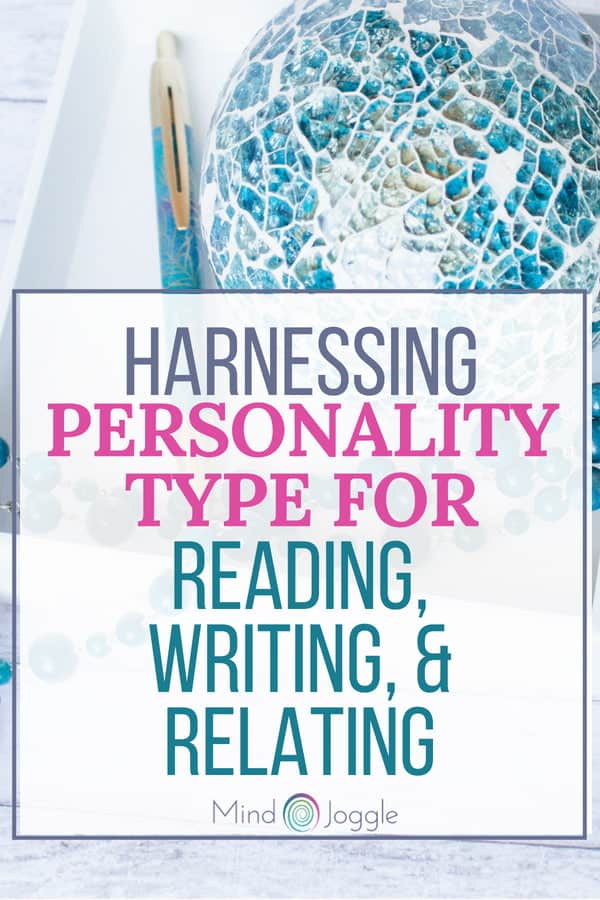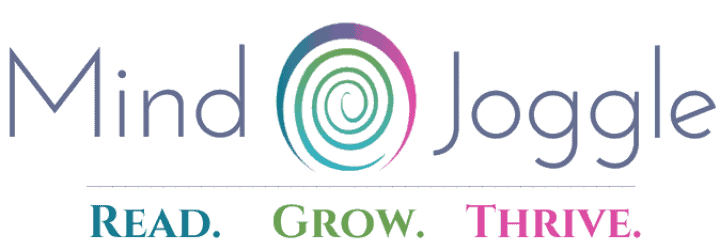Harnessing Personality Type for Writing, Reading, and Relating
This post may include affiliate links. That means if you click and make a purchase, I may earn a small commission. Please see Disclosures for more information.
I’ve been reading about Myers-Briggs (MBTI) personality types lately after taking a couple of free online tests on a whim (I like this one, though that site doesn’t strictly follow MBTI theory. Also, real MBTI tests would be administered by a professional trained in the use and interpretation of the instrument.)

Prior to this recent foray into the topic, I didn’t put a lot of stock in personality typing. Tests I took years ago typed me as an INTJ—introverted, logical, organized. If you’re not familiar, here are the letters used to describe the 16 types:
- Introversion (I) or Extraversion (E)
- Intuition (N) or Sensing (S)
- Thinking (T) or Feeling (F)
- Judging (J) or Perceiving (P)
Anyway, my INTJ typing was something I could sort of accept, but it didn’t seem entirely accurate in a way that I couldn’t put my finger on.
I can see now that I was probably answering the test in a way that reflected how many other people saw me, especially as a teen: logical, decisive, analytical, ambitious, organized. Growing up, I was always a high-achieving student. I was known for this, actually. It was a major part of my identity in the small town where I lived.
Because of this, people assumed that I was all of those things I listed above. And while a few of those traits are present in me, none of them are dominant.
I’m not a very organized person. I’m actually kind of disorganized. I have trouble managing clutter, though I’ve had to work much harder at this since creating my two sweet little clutter-makers (i.e. kids). I start out writing detailed outlines or schedules for projects and then lose steam, returning to them only when I have to (usually for my job). If there’s no reason to look at them again? Forgotten.
I find managing a household challenging because it’s not in my nature to focus on the small, daily details that keep a family running (in this way, I am actually organized. Routines and systems are the only way I manage to keep trains running—but it feels more like a necessity due to my own weaknesses than something at which I excel).
While I can be logical, I think I’m more often driven by emotion than logic. I see many possible perspectives and outcomes, so I tend to be indecisive. I can be comfortable with ambiguity and sketchy plans.
I’m a total pantser at life, to use a term often used by writers. (For non-writers: authors often consider themselves either a planner or a “panster”—one who writes by the seat of their pants. I’m a pantser at writing too, unless you count my scribbles on little scraps of paper scattered around my desk.)
But, I was a great student. That must have meant that I am full of order and logic. Or so I was told, and for a long time I internalized this.
In reality, I’m pretty sure I was a good student because I read like crazy, had an excellent memory, and worked hard. I was a perfectionist, especially when it came to school, and now, work.
Anyway, this is all a very roundabout way of getting to my own results: I am an INFP.
In addition to the traits mentioned above, INFPs are described as:
- Reserved or shy; can easily move into “hermit mode” when overwhelmed
- Driven by ideals
- Flexible and accepting
- Harmony-seeking
- Creative; many INFPs are writers and express themselves best in writing
- Dedicated to their own passions or projects, but can be filled with ideas and lack follow-through to finish
- Sees the “big picture” rather than details
- Conflict avoidant and take criticism personally
- Self-deprecating and hard to get to know.
All of these things describe me so well. While I could feel like a special snowflake because of my type (only 4% of all people are INFP), reading more about this type actually made me feel relieved that there are others like me.
There are other weirdos who sound like toddlers when they try to speak but who could write a beautiful essay on how they’re feeling! Others who sometimes hole up in a dark room when the world (or just too much socializing) overwhelms them! Others who can’t manage their junk mail and are likely to say, “We’ll figure it out,” with a shrug when presented with some future problem.
Not that I’m calling any of you fellow INFPs weirdos. That’s me, and I’m okay with that. But I’m glad to know you’re out there, too.
There’s something about having this description in front of me that helps me acknowledge my weaknesses; they are part of a whole, and seen together, the traits make more sense. But I also don’t see my personality type as an excuse for any of them. Like keeping my house organized, I need to find ways to adapt and improve.
At the same time, I want to embrace the positive—or even neutral—aspects of my personality. It’s okay that I sometimes need to withdraw; it recharges me and makes me a better mom, wife, and friend. It’s okay that I’m obsessed with books and the stories in my head (as long as I’m not completely disengaging from reality). These things make me empathetic and creative.
Writing and reading are things that I love, and things that I want to cultivate. And maybe understanding that I’m driven by my ideals can help me better define the things I should write about, move forward on my projects, and actually finish one of the many (many) writing projects swimming around in my head, my computer, and those scraps of paper.
I also need to recognize the ways that I work best and not feel like I need to adopt the processes that work for others–but I need to know when to push against my own inclinations. Specifically, I (and other INFPs) will often choose what to work on based on how I feel. If I’m not “feeling” a project, I will leave it sit until I am. This is usually okay. When I’m deep in the middle of several projects, one of them will usually grab me. The problem comes when I’m wrestling with something, or trying to finish. That’s when I need to just start (or finish, as it were), even when I’m not feeling it.
I’ll probably be thinking and writing more about personality types in the coming months. I’m no expert, and I haven’t delved into many of the other types yet, but I think they can be useful for understanding ourselves and the people we love.
And because I have to mention books, at least two that I’ve read this year feature INFPs: Anne of Green Gables and Jane Eyre. I read Anne before I started reading about personality types, but I was reading Jane when I took the tests. And then I couldn’t stop seeing it. More thoughts on Jane Eyre soon, but she is SUCH an INFP. I see other possibilities in recent books as well (Francie Nolan in A Tree Grows in Brooklyn? Marie-Laure in All the Light We Cannot See?).
Parchment Girl has a fun list of other INFPs in books and film (as well as other types). Her posts, as well as those from Modern Mrs. Darcy piqued my interest in the topic, so hat-tip to both of them.
Anyway, this whole post was a whole lot of navel gazing, and it’s always more fun to gaze at your own than someone else’s, so please share:
What is your personality type? Do you find the description to be accurate? How has learning it helped you?
Related:
How to Write with the Abandon and Confidence of a Child
Looking Ahead: Reading and Blogging in 2018
Here’s Why We Have an Art Room (and Not a Playroom)

